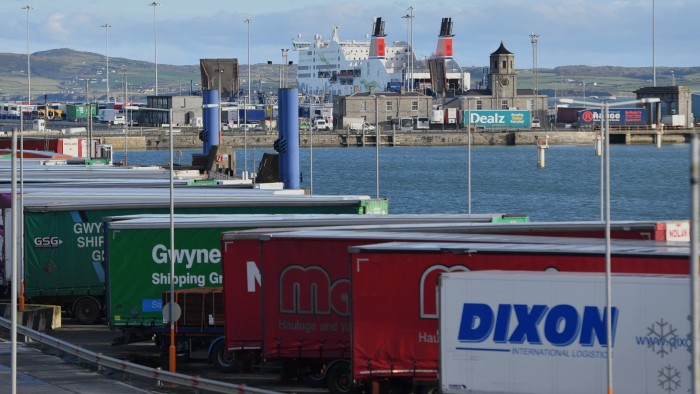Unlock the Editor’s Digest for free
Roula Khalaf, Editor of the FT, selects her favourite stories in this weekly newsletter.
The closure of one of the UK’s busiest ports following recent storm damage will lead to shortages and higher food and goods prices in Ireland, hauliers have warned.
Holyhead in north Wales will remain closed until mid-January at the earliest, after berths were damaged in Storm Darragh earlier this month.
The port is the main route for goods shipped between Britain and Ireland.
“The longer this continues, the more risk we have of shortages,” said Ger Hyland, president of the Irish Road Haulage Association.
“People only realise the importance of our industry when our wheels stop turning,” he added. “It’s absolutely going to be seen in [prices in] shop baskets.”
He called on the Irish government to “charter boats in Scandinavia or somewhere else . . . because at the minute, every ferry is at full capacity”.
Ireland-bound trucks have been diverted to other ports across the UK, but Hyland said that was racking up additional costs in terms of time, fuel and wages. After Dover, Holyhead is the UK’s second biggest “roll-on, roll-off” port — so-called because trucks can drive straight on to ships rather than being unloaded by crane.
“It’s disastrous for us,” Darren Murphy, owner of Irish haulier BM Transport, told BBC Radio Ulster on Wednesday. His company moves 75 to 100 loads through Holyhead every day and still has a backlog of 50 trailers in the Welsh port despite making alternative arrangements.
His company moves dry goods — including supermarket items, cereals, cleaning products and building materials — between the two islands and is already “down hundreds of thousands [of euros]”, he added.
Irish junior transport minister James Lawless, who has been meeting hauliers across the UK and Wales, said there were “plenty of ships” but that “access to the ports” remained the main bottleneck.
“That’s a UK-side issue only,” he told the FT. “I have been meeting with the UK and Welsh governments almost daily. They are doing their best but the ports are privately controlled and they have other customers as well as other demands, for example, renewable energy.”
Nichola Mallon, head of trade and devolved policy at Logistics UK, told BBC Radio Ulster: “All government departments are looking to see what steps they can take . . . to keep this freight moving.”
The disruption is also affecting some 150,000 people trying to return to Ireland through Holyhead for Christmas. Ferries are rerouting passengers.
Stena Line, which along with Irish Ferries operates the Dublin-Holyhead route, said it was “offering sailings for passengers and freight from Dublin to ports in Birkenhead and Fishguard”, as well as extra sailings on the route between Belfast and Cairnryan in Scotland.
It added: “In addition, a new freight route from Dublin to Heysham has been added to assist continuity of trade flows.”
Ruth Jones, chair of the UK parliament’s Welsh affairs committee, wrote to the government asking how it would help support those affected.
“Local and national businesses face not only the additional cost of rerouting goods but also the potential loss of goods, for example perishable goods,” she said in a statement.
An average of 2mn passengers use Holyhead a year and about 1,200 lorries and trailers make the crossing every day.
Source link









